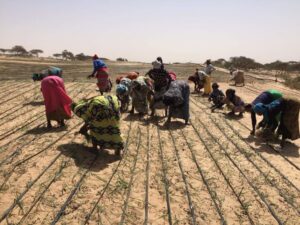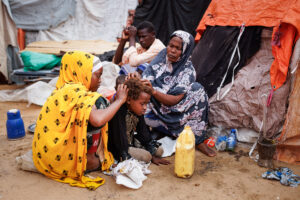Regional integration entails neighboring countries reaching agreements to enhance cooperation through shared institutions and regulations. This process involves the elimination of barriers to the free movement of goods, services, capital, and factors of production, thereby promoting trade and resulting in increased regional economic flows in relation to the rest of the world (Figuière and Guilhot, 2007). Two main approaches to regional integration are integration from above, driven by governments and institutions, and integration from below, led by civil society and businesses. Both approaches are not mutually exclusive; regional integration often combines top-down and bottom-up strategies. Since the establishment of the Equatorial Customs Union (UDE) in 1959, the Central African region has experienced a rich history of regional integration, but civil society involvement has been lacking.
This paper examines the underrepresentation of civil society in Central Africa’s regional integration process and the benefits of increased involvement. It proposes strategies to enhance civil society’s participation and concludes with key findings and recommendations for stakeholders.
The paper consists of five sections: the current status of civil society involvement in regional integration in Central Africa, barriers to participation, the role of civil society in facilitating integration, policy recommendations, and concluding remarks.
The Status of Civil Society Involvement in the Regional Integration Process in Central Africa
The Economic Community of Central African States (ECCAS), established in 1983 and revised in 2019, fosters cooperation with bilateral, multilateral, and non-governmental organizations (NGOs) through Articles 78 and 105. Civil society collaboration began in 2007 with the European Union’s Peace and Security Support Program for ECCAS (PAPS I), which assessed civil society organizations and collaboration opportunities in peace and security. ECCAS involves civil society in the Central African Early Warning Mechanism (MARAC), elections, small arms control, peacekeeping, independent media, and funding for civil society organization (CSO) projects, leading to the creation of the Central African Action Network on Small Arms (RASALAC) (ECCAS, 2017). The ECCAS-Society Collaboration Unit, located within the Department of Human Integration, Peace, Security, and Stability, underscores ECCAS’s commitment to peace and security. The ECCAS Indicative Medium-Term Strategic Plan 2021-2025 identifies six priority areas, with civil society actively participating in Social Integration and Human Development, particularly in education and employment statistics.
The Economic and Monetary Community of Central Africa (CEMAC) Treaty does not mandate civil society involvement in the integration agenda, but CEMAC Directive No. 06/11-UEAC-190-CM-22 promotes transparency and good governance by allowing civil society access to budgetary information and governance discussions. However, the International Monetary Fund (2018) notes that implementation in CEMAC countries is difficult, with principles like civil society participation and contract transparency often neglected, leading to accountability issues in state-private contracts in the extractive sector.
The Treaty of the Economic Community of the Great Lakes Countries (CEPGL) lacks provisions for civil society participation in the integration process among the three countries. In 2006, member states revitalized the organization to promote peace, security, and socio-economic development, establishing the Regional Program of Action to involve civil society and stakeholders in program preparations.
The treaty provisions of ECCAS, CEMAC, and CEPGL reflect varying recognition of civil society’s role in Central Africa’s regional integration. ECCAS explicitly establishes cooperation mechanisms with civil society organizations, CEMAC acknowledges this role indirectly through its Code of Transparency and Good Governance, and CEPGL adopts a participatory approach in its regional programs without explicitly addressing civil society participation.
Despite these frameworks, civil society involvement in Central Africa’s regional integration is limited. ECCAS has attempted to engage civil society in elections, small arms control, and peace and security, but participation is often restricted. CEMAC’s Code of Transparency and Good Governance provides a framework for civil society in public finance management, though implementation is challenging. CEPGL’s participatory approach remains unrealized, leaving civil society primarily involved in policy implementation and excluded from agenda setting, research, policy creation, decision-making, and evaluation—five key stages of the policy cycle.
Barriers to Civil Society Involvement in Central Africa’s Regional Integration
According to the Civil Society in Africa Consultative Dialogue Series Report 2020 (Merwe & Gibril, 2020), which included the participation of 148 civil society leaders, civil society organizations (CSOs) in the Central African region identified five key challenges: capacity, funding, state repression, cooperation, and corruption. Furthermore, the state-centered approach to integration adopted by regional institutions tends to exclude CSOs.
- Funding: CSOs in Central Africa have identified funding as the primary challenge they encounter. Donor dependency has further complicated their sustainability and effectiveness.
- State Repression: Governments often intrude upon civil society activities by restricting civic liberties, imposing onerous bureaucratic procedures for CSO registration, or openly repressing activists. This persecution reflects a broader pattern of human rights violations in Central African countries.
- Civil Society Cooperation: CSOs are less successful due to their failure to establish alliances. The limited availability of platforms that promote collaboration exacerbates challenges in cohesiveness and cooperation.
- Capacity and Skills: A major challenge is the inability of CSOs to effectively plan, implement, monitor, and evaluate initiatives. External factors include difficulties in recruiting and retaining qualified personnel and a lack of volunteerism in communities.
- Corruption within Civil Society: Corruption among CSO leaders undermines the sector’s efforts, while government corruption complicates CSOs’ work to expose dishonest authorities. Managing the sector is difficult due to numerous registered and unregistered organizations.
- Conception and Approach to Regional Integration: The absence of civil society in foundational texts highlights its exclusion from the conception of regional integration, limiting involvement in the operational implementation of the process.
The Role of Civil Society in Central Africa’s Regional Integration
An engaged civil society is vital for ensuring transparency, accountability, and participation in governance in Central Africa. Its role in regional integration promises various benefits for the region.
- Monitoring and Accountability: Civil society is essential for holding decision-makers accountable for the regional integration agenda, particularly as many commitments have exceeded their deadlines. Civil society can monitor progress and empower grassroots organizations to pressure governments for implementation.
- Education and Participation: CSOs play a crucial role in educating populations about the opportunities and benefits of regional integration. By fostering a bottom-up approach, they can help address transboundary challenges through transnational cooperation.
- Advocacy and Representation: Civil society can advocate for policies that meet community needs by engaging citizens in decision-making processes, ensuring that local experiences shape regional policies.
- Promoting Dialogue and Consensus: Civil society organizations offer analyses and sustainable solutions, enhancing conflict resolution strategies. Their involvement can address root causes of conflict and raise awareness of opportunities for dialogue.
Policy Recommendations
To maximize the benefits of civil society involvement in Central African regional integration, the following policy recommendations are proposed:
- Transition from State-Centered to People-Centered Integration: There is a need for a shift from a centralized approach to one that fosters grassroots participation. Enhanced civil society engagement has proven successful in other regions, contributing to more effective integration.
- Treaty Recognition of Civil Society: Stronger recognition of civil society in RECs’ treaties is essential. This includes clear provisions acknowledging civil society as a key actor and establishing mechanisms for participation.
- Granting Observer Status and Signing MoUs: Central African RECs can grant observer status to CSOs, enabling their participation in activities and discussions, and sign memoranda of understanding (MoUs) for flexible partnerships.
Conclusion
Central Africa’s regional integration has been hindered by limited civil society involvement and a top-down approach, resulting in a weak regional identity and economic integration. This paper explores the underrepresentation of civil society and the benefits of increased participation. Despite some acknowledgment from ECCAS, CEMAC, and CEPGL, civil society’s role is largely restricted to policy implementation. Six challenges contribute to this exclusion: the integration approach, limited capacity and funding, state repression, inadequate cooperation, and corruption. Enhancing civil society participation could improve accountability, community ties, education, and overall integration. This paper posits that civil society can significantly impact agenda setting, research, policy creation, decision-making, and evaluation in Central African integration.











